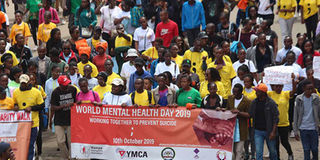Role of journalists in mental health education

World Mental Health Day is celebrated in Nairobi on October 10, 2019. Journalists have invested their own time and resources to learn about the complex world of mental health. PHOTO | FILE | NATION MEDIA GROUP
What you need to know:
- The Kenya Psychiatric Association and the national government have as their key objectives the organisation of media workshops to find ways of helping our colleagues in the media.
- Journalists must also exercise caution in using photographs or video footage of a suicide, and take particular care in reporting celebrity suicides which will usually attract excessive attention.
For the past few years, the media has played an important role in reporting on mental health and ensuring that it is close to the top of our country’s health agenda.
Individual journalists have made huge efforts to get accurate information and write truthful pieces that place mental health at the top of our national priority list.
It is remarkable that even without expert guidance, a good number of journalists have invested their own time and resources to learn about the complex world of mental health, and to discover innovative ways of reporting on this important subject.
The mental health world in Kenya has taken note, and is currently engaging the media fraternity on the need for mental health literacy training for our media practitioners, as well as the possibility of developing a Code of Conduct to guide the fraternity on responsible reporting of mental health issues, including suicide.
CODE OF CONDUCT
Indeed, the Kenya Psychiatric Association and the national government have as their key objectives the organisation of media workshops to find ways of helping our colleagues in the media.
A new initiative headlined under the citiesRISE platform, and which is operating out of five cities in the world — Bogota, Chennai, Nairobi, Seattle, and Sacramento — has as part of its Nairobi programming prioritised media engagement and the development of a protocol or Code of Conduct to guide practitioners on mental health reporting.
Under this initiative, media owners, editors, and journalists will be engaged to review current reporting practices on mental health and suicide, and to develop evidence-based guidelines on how to do this better.
Media reporting has been shown to influence behaviours such as imitative suicides since the 18th Century, when Goethe’s The Sorrows of Young Werther was published and led to a suicide epidemic across Europe.
RESPONSIBLE REPORTING
Studies across the world have confirmed this phenomenon, and have led the World Health Organisation to develop guidelines for media practitioners to responsibly report on mental health and suicide.
An eleven-point WHO summary resource for media practitioners advises that whenever a death by suicide occurs, the media should always take the opportunity to educate the public on suicide, and avoid language that sensationalises or normalises suicide, or presents it as a solution to problems.
Further, journalists are advised to avoid prominent placement of the news item or undue repetition of stories about suicide, or the explicit description of the method used in a completed or attempted suicide.
WHO indicates that journalists must avoid providing detailed information about the site of a completed or attempted suicide, and that they should word headlines carefully to avoid unnecessary sensationalisation
EMPATHY
Journalists must also exercise caution in using photographs or video footage of a suicide, and take particular care in reporting celebrity suicides which will usually attract excessive attention.
Importantly, journalists must show due consideration for people bereaved by suicide, and at the end of an article on suicide, provide information about where to seek help.
Finally, it is recommended that journalists must recognise that media professionals themselves may be affected by stories about suicide, and resources must be made available to them after writing such stories.
Lukoye Atwoli is Associate Professor of Psychiatry at Moi University School of Medicine; [email protected]





